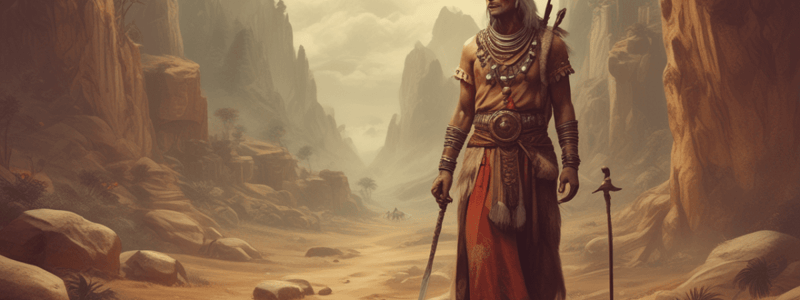Podcast
Questions and Answers
Which tool was found in ancient Egyptian tombs indicating their grooming practices?
Which tool was found in ancient Egyptian tombs indicating their grooming practices?
For what purpose did high-ranking Egyptians shave their heads?
For what purpose did high-ranking Egyptians shave their heads?
What material was first recorded as a coloring agent in 1500 BC by the Egyptians?
What material was first recorded as a coloring agent in 1500 BC by the Egyptians?
Which belief system elevated tribal barbers to positions of importance?
Which belief system elevated tribal barbers to positions of importance?
Signup and view all the answers
What did some tribes believe was necessary to exorcise bad spirits?
What did some tribes believe was necessary to exorcise bad spirits?
Signup and view all the answers
What was the role of the barber Meryma'at in ancient Egypt?
What was the role of the barber Meryma'at in ancient Egypt?
Signup and view all the answers
Which tribes often wore their hair in intricate braids to denote status?
Which tribes often wore their hair in intricate braids to denote status?
Signup and view all the answers
What did Egyptians use to maintain their bodies’ purity before entering the temple?
What did Egyptians use to maintain their bodies’ purity before entering the temple?
Signup and view all the answers
What cosmetic was the most popular among ancient Egyptians?
What cosmetic was the most popular among ancient Egyptians?
Signup and view all the answers
Which of the following did Africans use to decorate their hair?
Which of the following did Africans use to decorate their hair?
Signup and view all the answers
Study Notes
Primitive Cultures and Barbering
- In many primitive cultures, there was a connection between the body, mind, and spirit, leading to superstitions and beliefs that merged spirituality, religious rituals, and medical practices.
- Some tribes believed that good and bad spirits entered the individual through the hairs on the head, and cutting the hair was a way to exorcise bad spirits.
- In another ritual, long hair was worn loose to allow evil spirits to exit, and then the barber would cut and style the hair to keep good spirits in and bad spirits out.
- Tribal barbers held positions of importance, such as medicine men, shamans, or priests, due to their belief systems.
Ancient Egyptian Barbering
- The Egyptians were known for cultivating beauty in an extravagant fashion, as seen in tomb excavations that revealed combs, brushes, mirrors, cosmetics, scissors, and razors made of copper and bronze.
- Coloring agents made from natural materials were used on the hair, skin, and nails, with eye paint being the most popular cosmetic, and henna as a coloring agent first recorded in 1500 BC.
- Egyptian noblemen and priests used barbers, as recorded in written records, art, and sculpture, and had their heads shaved every third day for comfort and to prevent parasitic infestations.
- Barbers would also shave the priest's entire bodies to ensure purity before entering the temple.
- The barber Meryma'at was held in high esteem, as his image was sculpted for posterity.
African Barbering Traditions
- In some African cultures, hair was groomed with intricately carved combs and decorated with beads, clay, and colored bands.
- The Masai warriors, for example, wove their front hair into three sections of tiny braids, and the rest of the hair into a queue down the back.
- Braiding was used extensively, with intricate patterns frequently denoting status within the tribe.
Studying That Suits You
Use AI to generate personalized quizzes and flashcards to suit your learning preferences.
Description
Explore the fascinating relationship between hair, spirituality, and medical practices in ancient cultures. Learn how hair was seen as a connection to the body, mind, and spirit, and how it was used in religious rituals and ceremonies.





